By Ellen | September 4, 2009
Here are more pictures of children at Morningside Hospital in 1923. Children were sent to Morningside because they had mental and physical disabilities, many of which we would call developmental disabilities today. This is the diagnosis for a child from Anchorage:
“Adrnitted November 7,1925. Anchorage. A native child of four years. Speaks no English. Physical examination affords no information aside from partial deafness. Physical condition good,”
The caption on the first photo below is, ” Orphans of the Far North – Alaska defectives happily housed in the mild climate at Morningside.”
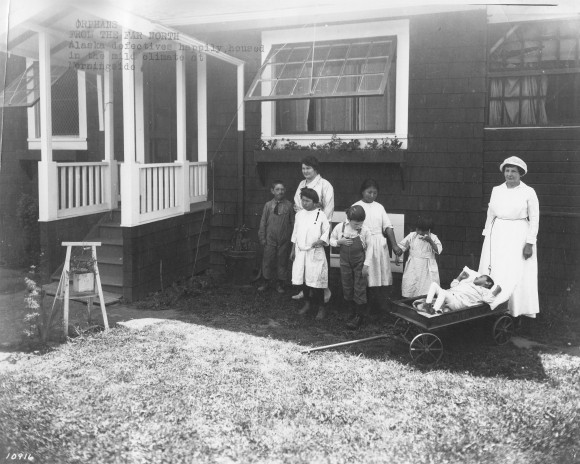
Record Group 126, Records of the Office of the Territories, National Archives II, College Park, MD
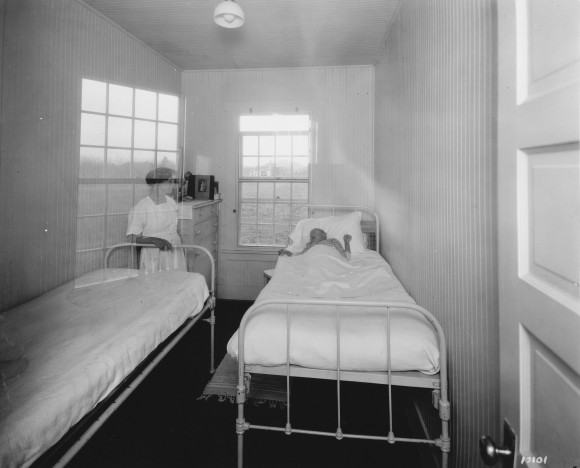
Record Group 126, Records of the Office of the Territories, National Archives II, College Park, MD
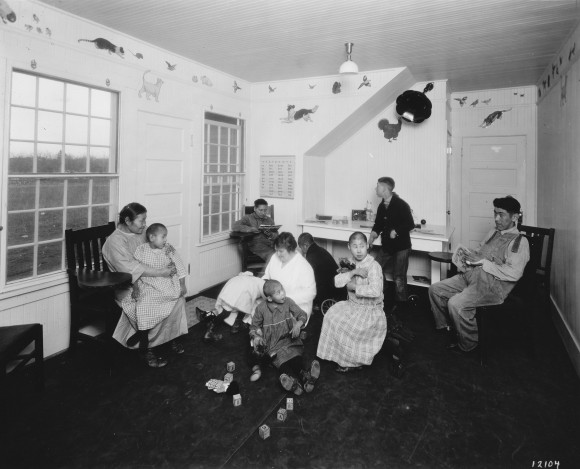
Record Group 126, Records of the Office of the Territories, National Archives II, College Park, MD
By Ellen | September 2, 2009
It was never clear to me when Morningside Hospital started admitting children. The patient lists during the early years seemed to be populated by miners, gamblers and other who came North to seek their fortunes. By the time Alaska assumed responsibility for providing mental health services to its citizens in 1956, a significant percentage of patients at Morningside were children with developmental disabilities. Some admitted soon after birth.
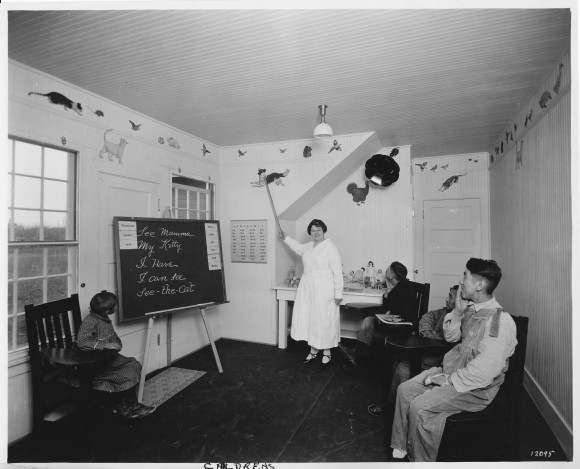
Record Group 126, Records of the Office of the Territories, National Archives II, College Park, MD
The National Archives II provided the following information from the Department of the Interior files:
On November 9, 1922, Scott C. Bone, the Governor of Alaska, sent a telegram to the Secretary of the Interior asking, “Can mentally defective children of Alaska be committed to Morningside under existing contract stop Institution is now equipped to handle such cases.”
The next day, Assistant Secretary of the Interior F. M. Goodwin responded, “Replying your telegram November ninth. Unless mentally defective children of Alaska are legally adjudged to be insane they cannot be cared for at Morningside Hospital under the contract with Sanitarium Company.”
The decision to commit children to Morningside in the same way adults were handled apparently came swiftly. Children were taken before a jury of six men and adjudicated “insane”. The photo above is from 1923.
By Ellen | September 1, 2009
Our research at the National Archives II resulted in new information on patient burials, though we still can’t pinpoint where individual patients are buried. Here’s what we found:
- Morningside Hospital contracted with funeral homes, which prepared the bodies for burial and arranged for burial in a number of Portland cemeteries. Holman and Lutz Funeral Home is the one mentioned most often in the records for the 1940s and 1950s.
- So far, we’ve found at least four cemeteries mentioned in the records: Greenwood Hills Cemetery, Multnomah Park Pioneer Cemetery, River View Cemetery, and Rose City Cemetery.
- In the 1950s, the federal government paid $75 for Morningside Hospital patient burials. There was a good deal of correspondence between Morningside and the Department of the Interior about how inadequate this fee was, comparing it to burial fees provided by the Bureau of Indian Affairs and similar institutions. The federal government refused to cover the cost of grave markers which is one of the reasons it is so difficult to locate individual graves.
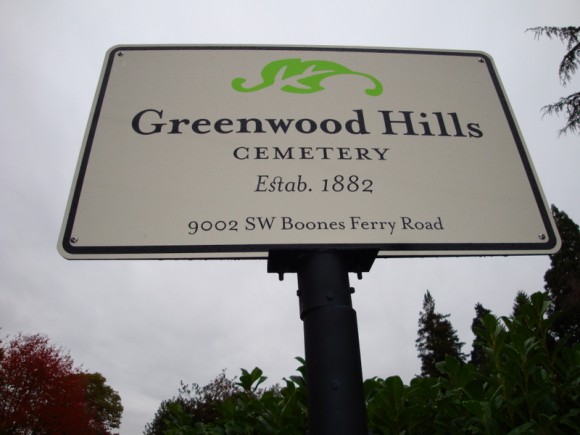
Greenwood Hills Cemetery, Portland, OR
By Ellen | August 20, 2009
Over the years, the Department of the Interior conducted a number of investigations of Morningside Hospital. The photographs taken as part of these investigations are one of the few sources of images of patients that we’ve found. Here are a few from the 1935 investigation.
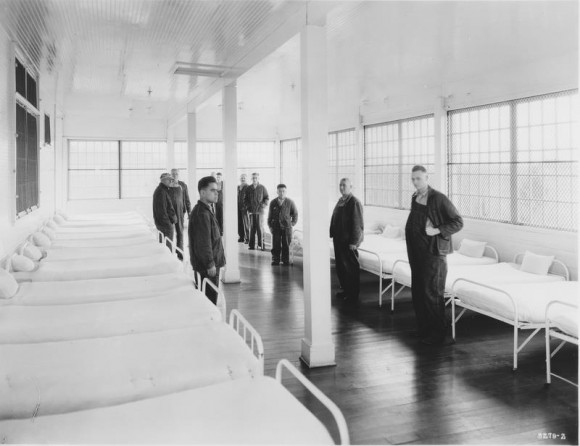
One of the Men's Wards
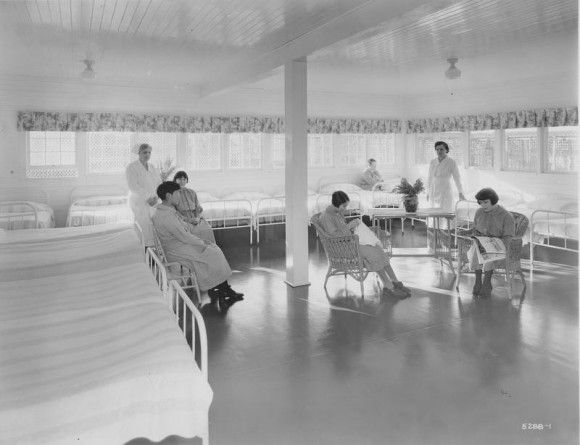
Women Patients Doing Needlepoint
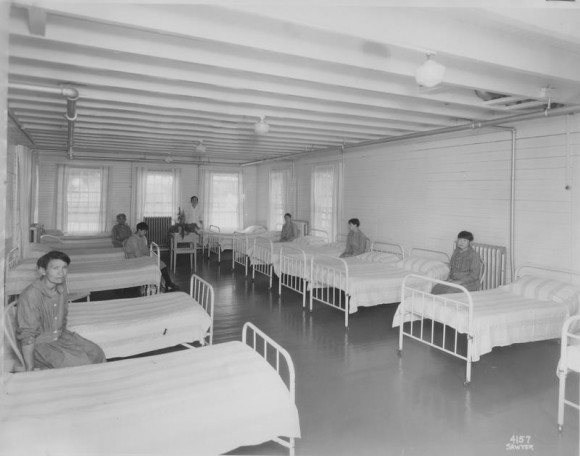
One of the Women's Wards
By Ellen | August 18, 2009
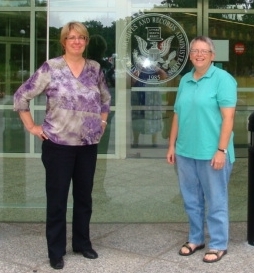
Karen and I spent Wednesday through Friday of last week at the National Archives II in College Park, MD. After worrying that we wouldn’t find any patients records, we found more than I imagined possible. Too much, in fact. They have nearly all of the Morningside Hospital patient lists from 1904 through the early 1950s, plus contracts, investigation reports, personnel records, medical officer reports, and administrative correspondence between Morningside and the Department of the Interior. We worked each day for 10 to 11 hours, scanning and copying. In the end, we had nearly a gig of scanned documents and photos and a 4 inch stack of copies. I don’t think we made a dent in what’s there.
This presents us with an entirely new set of questions, the most important of which is how to handle this much information and make it readily available to families and other researchers. Over the next month, we’re going to seek advice on the organization of historical collections and database design. In the meantime, we’ll post more patient lists and articles on some of the more interesting information and photos we found in the files.
Stay tuned.
By Ellen | August 3, 2009
Karen and I are headed to College Park, MD, next week to spend three days at the National Archives. Prior to statehood, the US Department of the Interior, Office of the Territories, contracted with Morningside Hospital for the care of Alaskans with mental illnesses. The federal records for these years are at the National Archives.
We are very excited about two record groups in particular:
Letters Received and Related Records concerning the Alaskan Insane, compiled 1900-1911:  This series consists of letters received, copies of contracts, telegrams, vouchers, lists of patients, and other records. Some of the correspondence refers to policy, but most of it concerns the custody and care of mental patients, discharge of cured individuals, and related topics.
This series consists of letters received, copies of contracts, telegrams, vouchers, lists of patients, and other records. Some of the correspondence refers to policy, but most of it concerns the custody and care of mental patients, discharge of cured individuals, and related topics.
Record Group 126, Records of the Office of the Territories: This record group includes 26 boxes pertaining to the care of the insane in Alaska.
The records will undoubtedly provide more information about the operation of Morningside Hospital and its relationship with the federal government. Of course, our greatest hope is that the boxes at the National Archives contain patient lists. If the patient lists are not there, we’re out of ideas and pretty much at a deadend.
Please contact us if there are particular records that interest you. Let’s all keep our fingers crossed.
From “The East Portland Historical Overview and Historic Preservation Study” published by the City of Portland Bureau of Planning and Sustainability (March 2009)
“For nearly sixty years, Morningside Hospital sat on a 47-acre parcel in Hazlewood, at the junction of SE Stark Street and 96th Avenue. Formerly agricultural land, the site was developed as a psychiatric hospital complex and working farm in 1910. After WWII, many of the farmers in the surrounding area retired and their land was developed into suburban communities. The rising population increased consumer demand and the under-construction interstate freeway promised easy access; in 1970 the site was redeveloped as Mall 205.
The hospital, founded in 1899 by Dr. Henry Waldo Coe, was originally run out of his family’s home. In 1905, Coe purchased the Massachusetts Building from the Lewis and Clark Exposition and moved it from the exposition site in NW Portland to Mt. Tabor, where it was converted into a psychiatric hospital. Five years later, Dr. Coe moved Read More »
We’ve gotten a number of emails from people who have found a relative on one of our patient lists. All of them wanted to know where their relative was buried. Unfortunately, we don’t have much information on patient burials, though we’re working on it.
For now, here’s what we know:
Cemeteries: Over the years, Morningside Hospital patients were buried in multiple cemeteries. During the 1940’s and 1950’s, Multnomah Park Pioneer Cemetery and Greenwood Hills Cemetery were the sites of patient burials. We located a few patient graves at Greenwood Hills, but most are unmarked or grown-over. Multnomah Park Pioneer Cemetery is still in operation but Read More »
The 1920 US Census data has been posted and added to the Wall of Names. The Census data is interesting in that it contains information that our other lists do not, including birthplace, marital status, literacy, race, and mother tongue, all of which will be helpful to researchers tracking down family history. This was a hand-written document that had to be transcribed into a spreadsheet, we’ve done our best to ensure the data was copied accurately, but there may be typos.
You can view these lists here: 1920 US Census
When we posted the 1955 Department of the Interior Report, we pointed out some names that appeared on both that list and the Wickersham Papers. With the addition of the 1920 US Census list there are even more names that appear on multiple lists, helping to fill out the profile of some Morningside patients. Read More »
The Morningside Hospital patient list found in the 1955 Department of the Interior (DotI) Report has been posted and incorporated into the Wall of Names.
You can view these lists here: 1955 Department of the Interior Report
The Wall of Names is sorted alphabetically by last name, and then by first name, rather than by source. The intended reason for this was to organize the names in a way that makes it easier for someone researching their family history or looking for a specific name to find the name they’re looking for. The other effect of sorting the names like this is that names that appears on more than one list group together. In adding the names from the Department of the Interior Report from March 1955, I stumbled upon a few patients who’s names appear in Judge Wickersham’s list from Morningside in 1916 and in the 1955 DotI Report. Read More »









